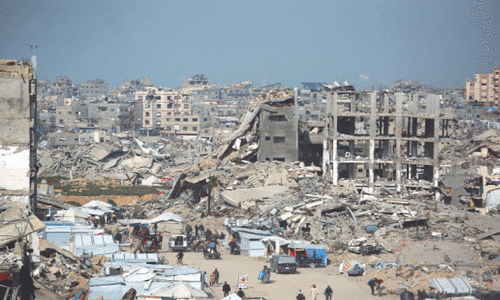KHYBER: Amid complaints about a lack of facilities and shortage of essential items, over 1,000 out of the total 2,041 displaced Kukikhel families have returned to the Thor Chappar area of Tirah Valley here since the second phase of their repatriation began on Oct 29, say officials.
They, however, insist that most of the returnees went back to Jamrud and Peshawar due to the dilapidated condition of their homes, harsh weather, and acute shortage of essential commodities.
Several families complained about missing goods from non-food item kits and a delay in payment of cash grants, with some managing transportation costs on their own.
They said that it was extremely difficult for most returnees, especially women and children, to live in tents in cold weather with limited facilities.
Over 1,000 of 2,041 families go to Thor Chappar since start of repatriation on Oct 29
Qibat Khan, one of the returnees, told Dawn that not a single house in the entire Thor Chappar area was fit for living as those buildings were either damaged in artillery bombing and air strikes, or collapsed due to heavy rains and snowfall.
He said that all returnees were in dire need of shelter to protect them as the winter began to bite, while clean drinking water was also required as most water channels and natural springs were damaged by heavy rains and snowfall.
The returnee demanded immediate start of a damage assessment survey to determine the scale of destruction of private properties for the early payment of compensation to the families.
However, Provincial Disaster Management Authority director Sobia Hassan Turo insisted that the return of Kukikhel families, mostly unregistered, to Thor Chappar was in progress amid a plan to provide every possible assistance to each of them in the form of tents and non-food items along with a cash grant of Rs35,000 in active collaboration with law-enforcement agencies.
She told Dawn that the PDMA would also shoulder the responsibility of rehabilitating the damaged infrastructure while rebuilding schools, health units, roads and equitable compensation for damaged houses.
According to official figures, 1,091 displaced families with 1,094 members were sent back to their homes, comprising 60 residential compounds, in the recently de-notified region of Thor Chappar in Tirah Valley.
However, the returnees included just 47 women and 27 children, as most families preferred to send only male members due to the unavailability of resources and basic facilities in the terrorism-affected regions.
The affected Kukikhel families took out protest demonstrations and blocked the Peshawar-Torkham Highway for almost two months to compel authorities to announce the second phase of their return on Oct 22.
Official sources told Dawn that the return of families displaced from Barai, Daman, Pakdarra, Bagh Kalay and Ghwakhay villages had completed a few months ago, while the repatriation of those from Nakai, Cheengai, Bakhtakhel, Babbar Kachkol, Thordarra, Kharwalay and Kachkol would begin on May 25, 2025, subject to the improvement of security situation in the region.
Published in Dawn, November 16th, 2024













































